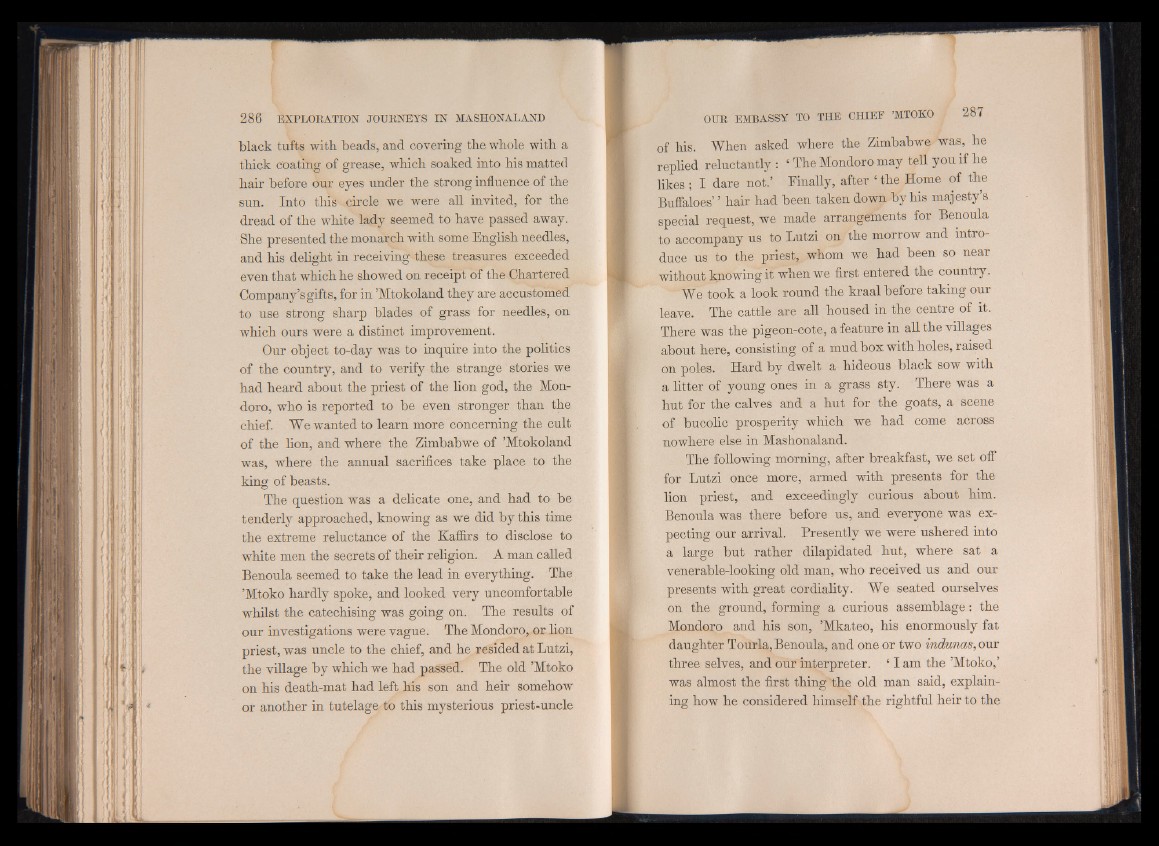
black tufts with beads, and covering the whole with a
thick coating of grease, which soaked into his matted
hair before our eyes under the strong influence of the
sun. Into this circle we were all invited, for the
dread of the white lady seemed to have passed away.
She presented the monarch with some English needles,
and his delight in receiving these treasures exceeded
even that which he showed on receipt of the Chartered
Company’s gifts, for in ’Mtokoland they are accustomed
to use strong sharp blades of grass for needles, on
which ours were a distinct improvement.
Our object to-day was to inquire into the politics
of the country, and to verify the strange stories we
had heard about the priest of the lion god, the Mon-
doro, who is reported to be even stronger than the
chief. We wanted to learn more concerning the cult
of the lion, and where the Zimbabwe of ’Mtokoland
was, where the annual sacrifices take place to the
king of beasts.
The question was a delicate one, and had to be
tenderly approached, knowing as we did by this time
the extreme reluctance of the Kaffirs to disclose to
white men the secrets of their religion. A man called
Benoula seemed to take the lead in everything. The
’Mtoko hardly spoke, and looked very uncomfortable
whilst the catechising was going on. The results of
our investigations were vague. The Mondoro, or lion
priest, was uncle to the chief, and he resided at Lutzi,
the village by which we had passed. The old ’Mtoko
on his death-mat had left his son and heir somehow
or another in tutelage to this mysterious priest-uncle
of his. When asked where the Zimbabwe was, he
replied reluctantly : ■? The Mondoro may tell you if he
likes ; I dare not.’ Finally, after ‘the Home of the
Buffaloes’ ’ hair had been taken down by his majesty’s,
special request, we made arrangements for Benoula
to accompany us to Lutzi on the morrow and intro
duce us to the priest, whom we had been so near
without knowing it when we first entered the country.
We took a look round the kraal before taking our
leave. The cattle are all housed in the centre of it.
There was the pigeon-cote, a feature in all the villages
about here, consisting of a m u d box with holes, raised
on poles. Hard by dwelt a hideous black sow with
a litter of young ones in a grass sty. There was a
hut for the calves and a hut for the goats, a scene
of bucolic prosperity which we had come across
nowhere else in Mashonaland.
The following morning, after breakfast, we set off
for Lutzi once more, armed with presents for the
lion priest, and exceedingly curious about him.
Benoula was there before us, and everyone was expecting
our arrival. Presently we were ushered into
a large but rather dilapidated hut, where sat a
venerable-looking old man, who received us and our
presents with great cordiality. We seated ourselves
on the ground, forming a curious assemblage : the
Mondoro and his son, ’Mkateo, his enormously fat
daughter Tourla, Benoula, and one or two indunas, our
three selves, and our interpreter. ‘ I am the ’Mtoko,’
was almost the first thingThe old man said, explaining
how he considered himself the rightful heir to the